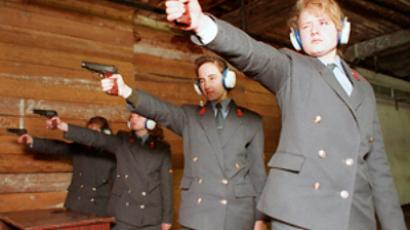Saying no to capital punishment – ban on death penalty upheld
Russia’s Constitutional Court has ruled out the return of the death penalty to Russian courts after the 10-year moratorium on capital punishment expires on January 1, 2010.
The Chairman of the Constitutional Court, Valery Zorkin, referred to the international regulations signed by Russia which ban or recommend eliminating of the death sentence.
He reminded the court that Russia was introduced into the Council of Europe only after a promise made to ban death sentence.
The Chairman of Russia's Constitutional Court says it's still up to lawmakers at the State Duma to ratify today's ruling.
“This is the prerogative of the State Duma and the Federal Assembly in general. No other authority, including the Constitutional Court and even the President himself can force the State Duma to ratify this protocol,” Valery Zorkin pointed out. “The President did his part, as you know. He has sent the documents to the Duma. Now it is up to State Duma whether to ratify the amendments to the Criminal Code and the Criminal Procedure Code.”
The Constitutional Court’s press service says that, de facto, the death penalty has been banned in Russia forever, informs Interfax news agency.
State Duma deputy Boris Gryzlov believes that there is not enough time to ratify the death penalty ban in December, before the moratorium ends, so it “has to be extended anyway.”
Russia signed the European Charter agreement that includes the death penalty ban, but the Charter has not been ratified by Russia for a number of years. Should for some reason Russia decide not to ratify the Charter, then this decision of the Constitutional Court could theoretically be revised and the ban could be lifted – but that is a very slim chance.
Many people in Russia still hope that this decision is not final and could be reversed. They believe that capital punishment is an absolute necessity for the most severe types of crime, like sex offenders, child molesters and terrorists.
For instance there was a huge outcry throughout Russia after a siege at a school in Beslan in the Russian North Caucasus, seized by international terrorists.
At the trial of the only terrorist who survived, Nurpashi Kulaev, the relatives of the children that died during a school siege actually called for the death penalty moratorium to be lifted just for one man. And there are a number of similar cases.
Many people still hope that capital punishment will be introduced in Russia again, but as of today it is not likely to happen.
Olga Kamenchuk, a spokesperson of the Russian Public Opinion Research Center, told RT that now the Russian authorities will have to explain to the nation why it was decided to keep moratorium on the death penalty in Russia, since a majority of the Russian citizens support the capital punishment to terrorists that launch attacks on civilians.
“This decision will have to do with the public opinion and the way these issues be clarified to the audience and more information about the social cost that the country is carrying due to the situation.”













